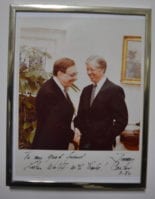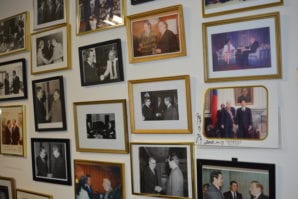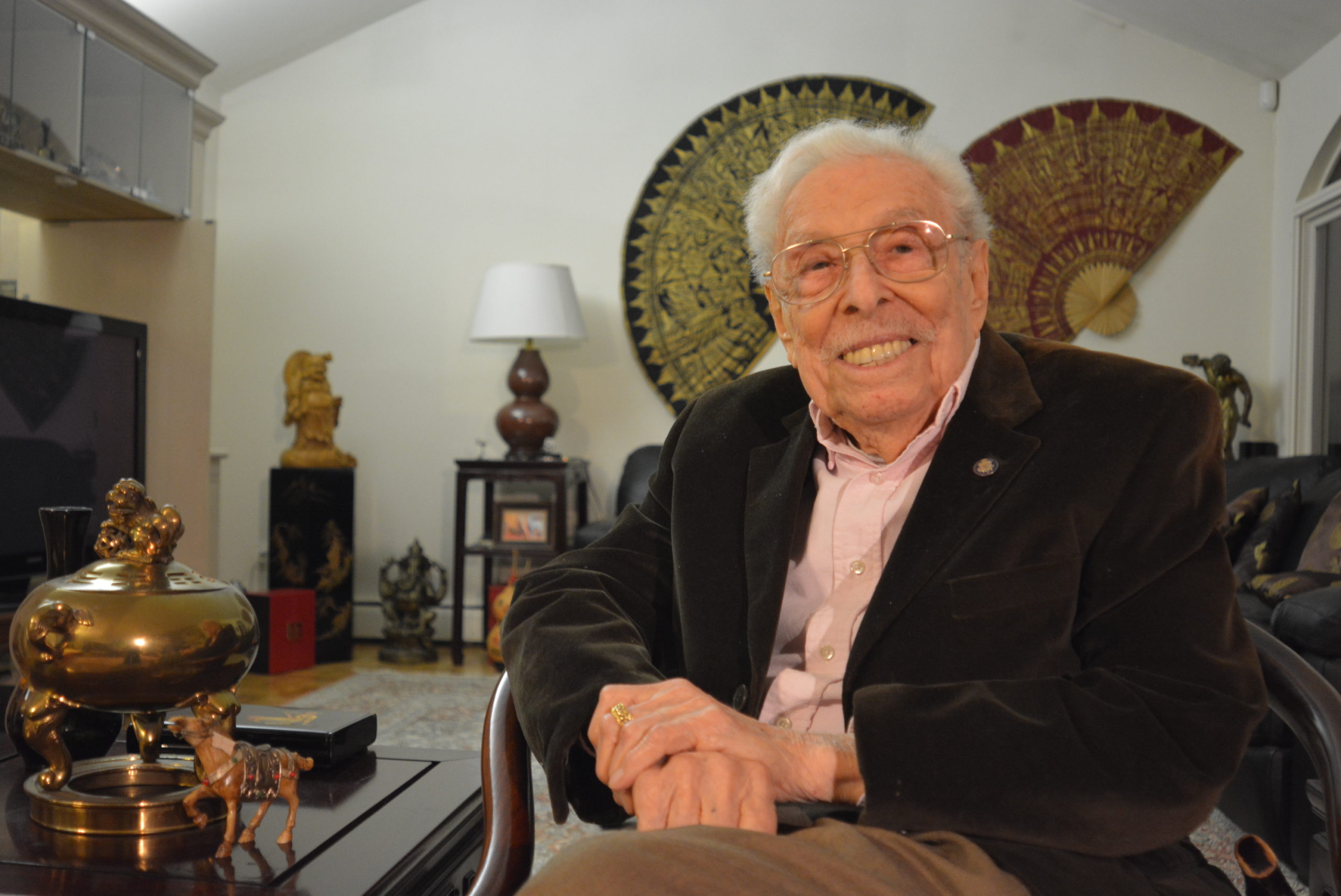Three days after the Saturday he turned 100, former Congressman Lester Wolff is busy at his home desktop computer.
He has a deadline to make. He’s only a quarter of the way through a book he’s writing that’s due in March. And it’s only one of the three books he’s working on.
Wolff, a Democrat, is clad in a button-up with a brown velvety jacket. His home office almost looks like a normal home office – some rolling chairs, a PC, a wall of framed photos – until you look at what’s actually pictured in the photos.
There are he and Bill Clinton, he and John F. Kennedy, he and Ariel Sharon. Name a world leader and he or she is on that wall.
In a back corner, it’s Wolff with religious officials. In one he’s shaking hands with Pope John Paul II.
“You know, there are very few people who can say they’ve met a saint,” Wolff says.
There are also very few people who make it to 100 years old. He’s the oldest living former member of Congress, a distinction he earned when he was only 99.
“I’m looking forward to working with him for another 100 years,” said former Congressman Richard Swett, who says Wolff mentored him as he entered the House of Representatives in the 1990s. “I don’t think he’s ready to slow down or come close to considering stopping at this point.”
Indeed, his age seems to be the least of Wolff’s worries.
“It doesn’t feel any different than when I was about 40 or 50 years old,” he said.
He travels to Washington, D.C., monthly to film an episode of his interview show “Ask Congress,” which has been running since the ’70s.

He’s in talks with Netflix about developing a movie about an “assassination attempt” he experienced while in a helicopter over the jungle of Southeast Asia’s “Golden Triangle.” He was there making an inspection while chairman of the House Select Committee on Narcotics Abuse and Control, and drug traffickers organized a mission to shoot him down.
It’s one of five such assassination attempts Wolff is documenting in one of his books in progress.
He remains deeply invested in politics, tweeting almost daily, often against President Donald Trump, whom he considers an “evil man.”
Wolff mentions, offhand, that he owns nearly 1,000 domain names. Just another hobby, he says.
“I feel I’m too busy to die,” he grins.
A legacy of reform
A small gathering of close friends and family attended Wolff’s 100th birthday party, including his two children, their children and those children’s children.
A gift from one of Wolff’s great-grandchildren sits in his office. It’s a poster, and at the top reads “100 years ago in the year 1919 when Lester was born.”
It was the year the Grand Canyon became a national park, it says. A movie ticket was 7 cents. World leaders signed the Treaty of Versailles.
That year, Wolff entered the world in Harlem.
He had a stint on stage in his teens after attending Juilliard for a year, tapping in a show called “Hits and Bits,” then attended New York University. When class was out at 1 p.m., he would head over to the Long Island Press, his earliest engagement with journalism.
Wolff served in the Civil Air Patrol in WWII. He ran an advertising agency, then also started a television program in which he interviewed politicians and other familiar faces in New York.
When he was elected to the House of Representatives in 1964, President Lyndon B. Johnson was in the process of creating his Great Society and was tangled up with the Vietnam War.
Wolff was sworn in the day before his 46th birthday and says he “set aside the seniority system,” ready to make some real change.
When asked if he considered himself an activist, it’s an immediate yes.
“I was one of the reformers,” Wolff says.
He voted for legislation against the Vietnam War and marched with civil rights activist Medgar Evers. He attended Martin Luther King Jr.’s funeral.
“I was one of the few members that did that,” he says.
Robert Zimmerman, who worked his way up from a campaign volunteer to Wolff’s deputy executive assistant, says Wolff was committed to serving every constituent who came into his office.
“He had a mobile van that would go around from community to community and he would sit there for hours,” said Zimmerman, founder of Zimmerman/Edelson Inc., a marketing, advertising and public relations company, and a Democratic national committeeman. “He was the first one to do that. It was a mobile congressional office.”
Wolff says a couple of his proudest achievements were on the international stage. He met with Chinese leader Deng Xiaoping during a time when the United States wasn’t formally recognizing China. They discussed Taiwan; Deng was hoping American ties with Taiwan wouldn’t hinder the potential for diplomacy with China, Wolff says.

Three weeks after his visit, the United States recognized China, Wolff says. But it de-recognized Taiwan.
Wolff then helped author the Taiwan Relations Act, which President Jimmy Carter signed. It exists to this day, maintaining ties between the U.S. and Taiwan.
“I would say that Taiwan is indebted to him to an extent that most of us, even those of us in the know, would never fully really appreciate,” Swett said.
This year’s freshman class in Congress might be a little too naïve about how far it can get in taking down Trump, Wolff says. Nonetheless, he’s optimistic about the country.
“America has always been able to survive these things,” Wolff says. “They survived Nixon. They survived Goldwater.”
No resolutions needed
Long Island has been home for Wolff for over half a century.
His house in Muttontown is ornamented with Asian art, which he says he’s been collecting since the 1950s.
On a front table is his Congressional Gold Medal, which he received in 2014, just 238 years after Congress approved its first recipient, George Washington. It sits near a photo of Wolff’s wife, Blanche Silvers, who died in 1997.
Sometimes, when he’s in Great Neck, he goes by his old house, Wolff says. He lived there for more than 50 years.
He still belongs to Temple Emmanuel, which he helped found.
“I like Long Island very much,” he says. “In fact, I feel I’m part of Long Island.”
Wolff’s smile is nonstop. While an issue in his right leg has him avoiding stairs and aids in his ears help him hear, he says he’s “in good shape.”
He didn’t make any New Year’s resolutions for 2019.
“I’m past that stage,” he says. “The resolution is to get up in the morning.”
Which day after day, he does. After reciting some prayers and suiting himself in a sharp outfit, it’s back to work.



